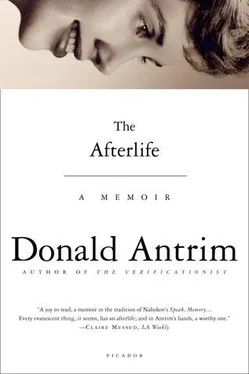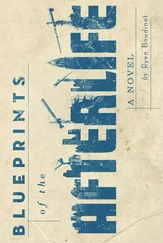In 1981, the year I left college and moved to New York, twelve years after my father’s Virginia colleague had come to our house with a gun, my mother was taken to Mercy Hospital in South Miami. She was admitted, my father told me, for alcoholic hepatitis. She was held at Mercy for a few days, not many, until she was considered sufficiently detoxified, hydrated, rested, and nourished, and, after that, she was discharged, and a short time later my father had to drive her to the hospital again, and the process was repeated, and, a while after that, she went back again. Then, quite abruptly — or not at all abruptly, considering the long progress of decades — my parents’ marriage was over for good.
Over the next two years, my mother would be forced to attempt sobriety or die. These were the years when her father, then in his seventies, and I, in my early twenties, created our adult friendship. It was one of those friendships that are sometimes available between the nonconsecutive generations in broken, unhappy families.
I was a teenager when my grandfather retired from his job as a junior high school principal in Sarasota. He and my grandmother sold their large, Spanish-style house on Wisteria Street and moved into a cramped and unattractive condominium, which they hated. After that, circumstances allowed them to become regular visitors to the western Smoky Mountains around Asheville, just east of that part of the world from which they had originally come, and, in 1977, the summer I graduated from boarding school in Virginia, they retired from their retirement and bought a derelict bungalow on Third Street in Black Mountain, intending to restore it and, eventually, move in. Would I like to join them, to spend my summer before college working on an old house? Yes, I would be happy to come to North Carolina and work on the house.
And yet, once in Black Mountain, I had a tendency to abandon my grandparents to their painstaking and methodical, stooped-over, Presbyterian labors; each day, I fled the house in order to drive aimlessly over mountain roads that passed by indigent farms and even more indigent churches. I had no concept of work. What was wrong with me? When would my life begin? Looking back on that time, I have an impression of myself performing a kind of fitful, mild-mannered revolt against — what? Anhedonia? Boredom? My family? Or it was a protest against southern Protestantism in general, which I associated with prohibitions and taboos in a variety of forms, expressed negatively in the self-destructive or work-obsessed temperaments of, it seemed to me then, everyone I knew. But protests against the denial of pleasure bring no pleasure. In the spirit of someone with nowhere else to go, I turned the car around and returned to the house on Third Street, picked up steel wool or a rag, and found something to scrub.
The day came when we got around to the windows. These were painted shut and badly warped. There was no question of replacing them; they would be removed, their panes razored clean, the frames stripped with fine sandpaper, or, if too profoundly rotten, disassembled and rebuilt. This was heartbreakingly deliberate work. I remember windows pulled out, holes in the house. Inside the casements lay dust and dirt, dead animals’ tiny skeletons, the windows’ rusted pulley wheels and ancient counterweights, canvas sacks stuffed with lead shot and tied off, their ropes broken. I remember my grandfather’s old man’s hands worrying the wood, delicately touching, like a blind man reading, the surfaces of things; it was slow work that he seemed determined to make slower, as if work of any sort were equivalent to an act of obstinacy. My grandmother’s style was all harshness and haste — she attacked her chores. And I remained lazy and sarcastic; the screen door was always slamming behind me. Nonetheless I was attracted by my grandfather’s patience, by the care he took with this broken house. It wasn’t that I suddenly understood the value in a job well done. Far from it. It was that for a moment — a romantic moment destined to resonate and grow in magnitude over the years — I hoped (and this may have been a fantasy that I wanted to have about the man) that my grandfather had something to pass on to me, to teach me. And I imagined (because it did not occur to me to ask him) that what he had to teach me concerned the beauty in labor that is invisible to others, work that seems superfluous but isn’t, and that no one except the worker will see or even necessarily appreciate. The windows, when they went back in, slid up and down at a touch.
Fifteen years later, when my grandfather was nearing ninety, in the days right before he began having his heart attacks, and long after he and I had been brought together by my mother’s hospitalizations, we took drives together along the roads that led over the mountains, rambling, all-day excursions that infuriated my grandmother, who feared for his health. We’d stop on the shoulder in a hollow or a narrow valley, and my grandfather would get out of the car, unzip his trousers, and urinate; a frequent need for this was caused by his heart medication. Always, he drove. Bourbon, I suspected, was stashed in the tire well in the trunk — his guilty, exciting secret. At some point along the way, generally when we were far from home, out past Hendersonville, he might say, “Have I shown you the new stretch of the Blue Ridge Parkway that goes around Grandfather Mountain without touching the mountainside?” or, “You’ve never seen the Carl Sandburg house, have you, Don?”
“No, I haven’t,” I’d say, and he’d turn the car around, and off we’d go to our new destination.
Today, I cannot recall those outings without thinking back to the early 1980s, when he and I took turns caring for my mother. I do not know, can’t say, how many hospitalizations she endured — four? five? — on her way to sobriety, or how frequently she quit drinking for a week or a month, attended a series of AA meetings held in smoke-filled rooms, and then went out and picked up a glass. During these years, my grandfather and I became adept at hearing, in her voice on the telephone, the specific sounds — a softly rising inflection, like a plea uttered by a child, ending a whispered sentence; or a barely audible sigh — that told us she might be feeling defeated and hopeless.
“Your grandmother and I think we ought to drive down to Miami and spend some time with your mother,” he might say to me during one of our conversations.
Or, if my grandparents had recently done service, I might say to him, “Mom’s coming out of the hospital at the end of the month. Why don’t I fly down and pick her up and take her home?”
Or my grandfather might say, “Don, your mother is going to come to North Carolina for a week. She needs a rest.”
If my mother were on her way to Black Mountain, I might head south myself, and the four of us, three generations, would come together for a brief spell as a family.
Would it be wrong to remember those as happy times? Is it perverse to imagine, to believe, that she, in her struggle to live, in her nearly dying, took care of us?
Of all the stories from that era in my mother’s life — the era in which I found myself perpetually on call, waiting for bad or good news from Florida or from North Carolina — one stands out. This is the story of the time she came closest to drinking herself to death.
In the spring of 1983, she finished a monthlong detoxification at South Miami Hospital, in Coral Gables. The patients on the ward were diverse. One was an emaciated man with a long beard. He’d spent his life in the Everglades drinking whiskey. Another, a Cuban man with an enormous belly who’d worked as a baggage handler at the airport, had, each day on the job, while loading and unloading suitcases from conveyer belts and motorized carts, drunk two to three cases of beer. I remember my mother telling me that he had a wife and baby. There was a young blond guy who’d made and lost a fortune as a cocaine dealer; until entering the hospital, he’d carried thousands of dollars in his pockets. And I remember an aeronautical engineer who’d retired to the Florida Keys. According to my mother, he later piloted a plane of his own design into the Gulf of Mexico.
Читать дальше












